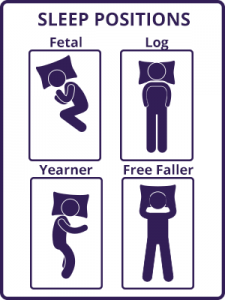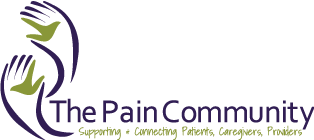 Insomnia can be a troubling side effect of all chronic pain conditions. Poor sleep can both cause pain and/or lower pain thresholds, meaning that existing pain is intensified. “Sleep hygiene” refers to actions you can take to establish and maintain healthy sleep/wake habits. Below are some tips for people who have a difficult time getting a good night’s rest:
Insomnia can be a troubling side effect of all chronic pain conditions. Poor sleep can both cause pain and/or lower pain thresholds, meaning that existing pain is intensified. “Sleep hygiene” refers to actions you can take to establish and maintain healthy sleep/wake habits. Below are some tips for people who have a difficult time getting a good night’s rest:
- If you smoke – quit.
- Limit alcohol consumption – alcohol consumption disrupts sleep.
- Limit naps to less than one hour, preferably less.
- Make sure your day is active and interesting.
- Beware of staying in bed too long; spending time in bed without sleeping leads to more shallow sleep.
- Keep a regular daily schedule – go to bed and get up at the same time.
- Follow a regular exercise program – exercise improves sleep.
- Make your sleep environment conducive to sleep – wear comfortable clothing or pajamas, keep your room temperature cool, close your blinds or curtains and limit noise.
- Do something relaxing before bed or practice relaxation techniques, such as meditation or guided imagery.
- Turn your alarm clock around so it is not facing you; do not look at the clock during the night as this can cause more stress and anxiety about your sleep.
- Keep a notepad and pencil by your bed to write down any thoughts that may wake you up at night so you can put them to rest.
- Reduce caffeine intake.
- Reserve your bedroom for sleep; do not use the bedroom for worrying, studying, discussing problems, arguing, paying bills, watching TV or reading.
- Do not take a hot bath or shower right before bed; the body needs to cool a degree before getting into deep sleep.
- If you can’t fall asleep in a reasonable time, get up! Reading a book or doing the dishes in another room may enhance feelings of sleepiness and help you rest more easily when you return to bed.
It may take three to four weeks of trying these techniques before you begin to see a noticeable improvement in your sleep but don’t give up! Good sleep helps your body recover.
Sleep Positions Reflect Your Personality
 1) Did you know that how you sleep tells something about you and your point of view? Body language expert Robert Phipps has studied the four most common sleeping positions—fetal, log, yearner and free faller. He has determined how these positions reflect your personality and outlook on life. Which one are you?
1) Did you know that how you sleep tells something about you and your point of view? Body language expert Robert Phipps has studied the four most common sleeping positions—fetal, log, yearner and free faller. He has determined how these positions reflect your personality and outlook on life. Which one are you?
- Fetal – Curled up on one side with arms bent and knees tucked. People who sleep in the fetal position are returning to their comfort zone to de-stress after the day’s activities. The higher the knees and the lower the head, the more internal comfort you give yourself. Fetal sleepers are conscientious, orderly and like things in their place, but they can over-think and worry unnecessarily.
- Log – Fully extended head, neck, arms, legs and body all stretched out in a straight line. The longer you sleep like this, the more rigid your thinking and the harder it is to be flexible, which could mean that you’re making things harder for yourself.
- Yearner – Side sleeping position with both arms outstretched. This could mean one of two things…either you are chasing your dreams or you are being chased. You feel you want more from life and are willing to go out there and get it with both hands, ready to capture every new and exciting challenge that comes your way.
- Free Faller – Whole body outstretched, flat on your stomach with arms bent and hands gripping the pillow. Physically this is the least comfortable position for most adults, and free fallers tend to feel like life happens around them while they are just hanging on for the ride, which leads to a feeling that they are not in control.
2) Do you pay attention to your sleep habits (sleep hygiene)? These are different practices that are necessary to have normal, quality nighttime sleep and full daytime alertness. According to the National Sleep Foundation, it is critical to maintain a regular wake and sleep pattern, seven days a week. The urge us to spend an appropriate amount of time in bed, not too little, or too much—just enough to avoid daytime sleepiness. A minimum of seven to eight hours of sleep in bed is the average requirement for most adults.
Other tips to consider:
- Avoid daytime napping as it can disturb the normal pattern of sleep and wakefulness. Timing of your medications may affect this, especially if they are known to cause drowsiness.
- Avoid stimulants such as caffeine, nicotine, and alcohol too close to bedtime. Alcohol may help you fall asleep, yet it disrupts sleep and causes arousal in the second half as the body begins to metabolize the alcohol. It also causes dehydration. If you are taking opioid pain medications, it is not advisable to be drinking alcohol anyway as this could cause an unintentional overdose.
- Exercise can promote good sleep. A relaxing exercise, like yoga, tai chi or an evening stroll before bed can help you fall asleep and stay asleep. Vigorous exercise should be reserved for the morning or late afternoon. So, it is important that your physical therapy appointments or visits to the gym are not late in the day.
- Food can interfere if eaten right before sleep, so avoid large meals close to bedtime. Dietary choices can cause sleep problems too, like spicy dishes and the caffeine from chocolate. Travelers often deal with unpredictable meal times and time changes, so this can be particularly challenging. Keeping a “goody bag” of healthy food can make a critical difference.
- Maintain adequate exposure to natural light during the day as light exposure helps maintain a healthy sleep-wake cycle. This is challenging during winter months in northern regions and for those with medical conditions that interfere with mobility as well as advancing age. Scheduling time outdoors especially on nice days is an important to keep as a priority. Weathering pain with sunshine helps build your levels of Vitamin D too.
- Establish a regular relaxing bedtime routine. Try to avoid emotionally upsetting conversations and activities before trying to go to sleep. Most of all, do not bring your problems to bed.
- Preserve your bed for sleep. Try to avoid using your bed to watch TV, listen to the radio, or read—sit in a chair or use another room for these activities.
3) Have you looked at what you are sleeping on? Nothing makes your body ache more than a low quality mattress and pillows. Support and proper body alignment is so important especially if you are living with pain. Investing in a quality mattress and supportive pillows can make a difference on whether your pain worsens or eases after a night’s rest. If you live with back pain, your mattress selection as well as sleep position is critical.
Did you know that if you have jaw pain from teeth grinding or TMJ that sleeping on your back will help your jaw relax at night? Using a towel or pillow roll under your neck and knees will help you sleep in a neutral position.
Know how to pick a mattress and be sure that you are present and can try out a new mattress before a new one is purchased. There are many to choose from and what works best for one person may not for another. The same goes for pillows. Personally, I am still in search of the ideal pillow—and I have bought or tried many. Good Housekeeping research on pillows may be useful to review before you decide to invest in new ones. WebMD has provided a guide on pillows if you have neck pain.
